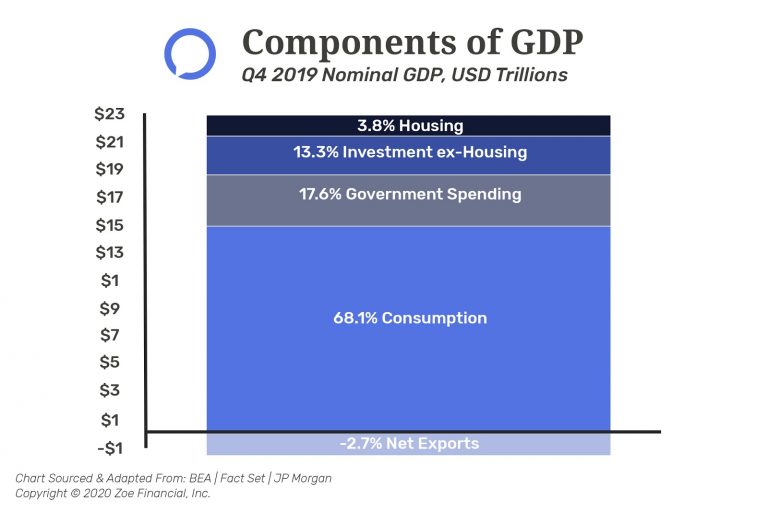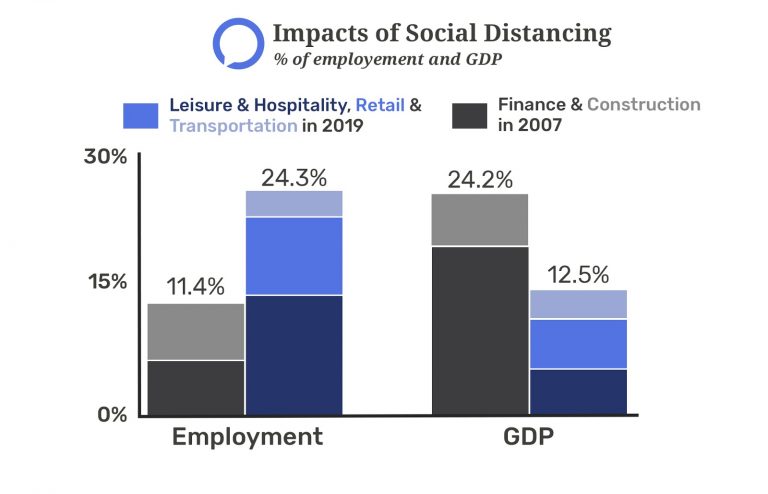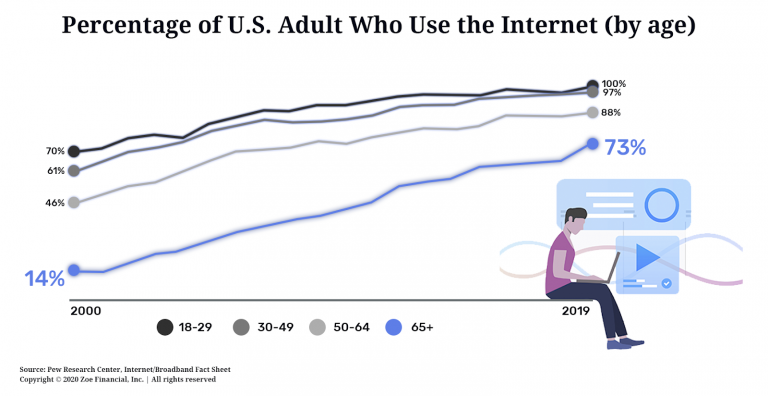The work-from-home economy is here to stay. Unexpected acceleration of new technology disrupting our daily lives is nothing new, but how we move forward as a society from here will surely change forever.
Naturally, the impacts of the COVID-19 public health emergency will stretch far beyond the weeks or months self-distancing and isolation take place. We might start being a little more grateful for our children’s teachers, a bit more germaphobic, and perhaps we’ll now ensure we always have a few extra rolls of toilet paper stocked up in the house. But the economic shock experienced during this public health crisis will extend far beyond the coming months or years. It’s likely to leave a remarkable legacy on the way the world as a whole act and interacts with one another.
The US economy thrives on consumption, it makes up more than ⅔ of the US GDP. As self-distancing continues throughout the country, meaningful decreases in consumption will lead to severe unemployment in the most heavily impacted industries of leisure, retail, and transportation.



The key thing to keep in mind with employment and GDP metrics during this crisis is that unemployment will increase tremendously, but GDP will likely not experience as painful a hit when compared to the Great Recession of 2007-9 when finance and construction were the most heavily impacted sectors of the economy. That said, impacts on the consumer’s psyche could be much longer-lasting.



It wouldn’t be the first time an economic crisis changes the way Americans live, after the Great Depression, the “waste not, want not” zeitgeist of the time imprinted the following generations to be resourceful, live within their means and save whatever possible.
Ever since the Great Recession of 2007-9, homeownership levels have declined due to both the impact on the consumer’s personal and their fears of another decimated housing market. Homebound life is likely not the only legacy this crisis will leave, both on the macro and microeconomic scale. The tech industry’s growth over the past two decades has undoubtedly already embedded itself in our everyday lives.



For example, prior to the COVID-19 pandemic, 88% of Baby Boomers were already highly active on the web. The internet has become intrinsically interwoven within the fabric of humanity, and the pandemic will only reinforce and strengthen our ties to technology.
While there is not yet concrete data on just how many Americans are now working from home as a result of the COVID-pandemic, we were already heading that way. As The Atlantic reports, technologies such as Slack and Zoom helped drive frictionless and location-agnostic collaboration amongst workers leading to the share of the US workforce working from home to triple over the past 15 years. This moment will further accelerate this trend across every industry. The way you interact with retail, entertainment, and services such as a routine consultation with your doctor or financial advisor virtually to meet the needs of a fully homebound society.
Retail and E-Commerce
How reliant were you on online shopping prior to self-isolation and quarantine? While the answer varies by home and income, the hyper-convenience of e-commerce that was previously a simple luxury is currently an absolute necessity. If you can’t leave the house, you must now discover tools, platforms, and services that will provide you everything from much-need clothes for lounging to your weekly groceries.
Industry titans in e-commerce, namely Amazon, have stepped up to this reality. The Wall Street Journal recently reported Amazon plans to hire 100,000 new full and part-time employees in the U.S. to meet surging demand and will be increasing salaries by $2 an hour through the end of April. Amazon’s big bet will pay off as we all adapt to the advantages of constant food and product deliveries, with minimal wait times, reduced friction in purchasing, and increased safety.
Entertainment & Leisure
Sheltering in place sanctions across the country means Americans will seek out digital entertainment services more than ever. As movie theaters, concert halls, and other physical venues shut down for the foreseeable future, Netflix, Hulu, and Amazon Prime, amongst others, will be go-to streaming services for a little screen-time when remote school or work ends. Even in-theater films that were intended to be released in the coming weeks will now be available online, according to Universal.
Video Calling services like Facetime, Zoom, Whatsapp Call/Video, and Skype are now being used more than ever. From calling grandparents to grabbing a glass of wine with friends, our interactions will now be entirely via screens. Additionally, new players such as HouseParty, a video chat app that enables spontaneous gatherings amongst multiple users, have emerged to entertain a generation in lockdown. From calling grandparents to grabbing a glass of wine with friends, our favorite interactions will now be entirely via screens.
Even travel, a favorite hobby for many, will now become a luxury. While it’s highly unlikely that most of us will be traveling any time in the near future, the disruption this health crisis causes on the transportation industry is sure to see effects in the long-term.
Professional Services
Service providers across the board are now in the process of adapting the consultations they typically provided in-person to a new online format. Physicians, for example, are now asking patients to avoid heading to hospitals or clinics and instead are opting for virtual appointments unless their patient is in critical condition.
On another front, if you haven’t gotten around to doing your taxes yet and are taking advantage of the extended tax deadline, you will have to opt for a virtual consultation with your accountant. At Zoe, many clients had already opted for virtual consultations with their financial advisor when going through their interview process. Since Zoe Network Advisors are highly adept at working virtually and remotely to advise clients, the burden of finding a financial advisor during this time of high financial stress and uncertainty can be easily be facilitated.
Long-Term Lifestyle Impacts
Since it is simply impossible to predict how long the public health crisis will go on, we will all adapt even more quickly to the digital revolution inside our homes. The longer society self-isolates and shelters in place, the more deeply the changes we are adapting too will embed themselves in our economy and everyday lives. The ease that technology brings, from quick online consultations to receiving any product you need at your doorstep, has become the new normal.
Ready to Get Started?
Real financial planning should pay off today, and in 10 years' time.